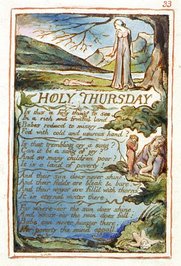Logic and language in "Patrolling Barnegat" - for GCSE and advanced students
the patrol
The title (which in Whitman’s original American English is spelled "Patroling Barnegat") offers a major key to understanding this opaque poem.
There are people on this beach who, through Whitman’s effort to pull us directly into the power of the storm, have been hidden so subtly that we must peer closely into his tight structure before we might spot them.
The “group of dim, weird forms” is the patrol – a group of people on the look-out.
What is the first reference to them?
Of course, the personification of the weather – variously appraised as “muttering”, as shouting like devils, as “savage” – implies a human observer who, in these early lines, would appear to be the poet himself.
However, in the fifth line the poet directs our attention to “there”, which, to put it at its simplest, is not “here”: the position which he occupies as primary observer. After telling us of the state of the margin between sea and land, he tells us that this is the “where” – or spatial location – of the patrol of “dim, weird forms”.
comprehending the -ing line-endings
At this point we can see that whereas hitherto the present participles (the –ing words) have referred to various aspects of the storm, they now begin to refer to the patrol: “breasting”, “advancing”, “wending”, “confronting”, and “watching” all tell us about what the “group of dim, weird forms” is doing.
The line in parentheses (brackets) is a set of imagined questions in the minds of the poet and / or the patrol members.
“never remitting” and “careering” refer once again to the storm.
Whitman's spurning of the finite verb
Throughout his work, Whitman frequently creates stanzas which contain no finite, or “complete”, verb. He has his reasons for this, which involve his desire to plunge us into the experience of being within his chosen phenomenon without reference to time, person or number.
Formal English tends to demand a complete verb as part of each discrete statement; this is a tyranny which many literary writers have striven to avoid, since it usually binds us into being specific about person, number and time.
Some languages are happy without, and allow us more easily to become absorbed into the intense moment of the experience, with no thought for the past, the future or even the present as a temporal concept.
Chinese, for example, offers opportunities for writers to abstract themselves from the world of the clock. “Tian qi hen hao” may be translated roughly as “weather” (tian qi – literally something like, but much more than, “sky energy”) “very” (hen) “good” (hao). There is no need for further specification, although this can be provided by introducing qualifiers or simply by the context. We render it into English as “The weather is very good”, because we feel a need for a verb form (“is”). Certain western grammarians have decided that because they believe any statement must contain a verb, “hao” should be classified as a “stative verb”: a verb which expresses a state of being.
However, in the English sentence we derive from the Chinese original, we classify “good” as a “complement” (or, less precisely, an “adjective”), while the empty, but time-specific, lexeme “is” gets classified as the verb.
filling the verse with present participles
Whitman’s way round in Patrolling Barnegat was to adopt the present participle (running, muttering, advancing etc). As Michael Swan points out in Practical English Usage (OUP 1980 & later), “present participle” is not a very good name, for it can be used to talk about the past and future too:
it had been running
it was running
it is running
it will be running
it will have been running
etc.
David Crystal in The Cambridge Encyclopedia of Language (CUP 1987 & later) reminds us that in some classifications, participles were listed separately from verbs.
However, the present participle's chameleon-like quality allows Whitman to employ it as his carry-all in his attempt to get us to lose ourselves in the experience.
being kosmos
Gay Wilson Allen in Walt Whitman: Leaves of Grass: Introduction(1955) tells us that Whitman “searched always for some profound truth residing in or emanating from external form, surface appearance or ‘show.’” The poet could range imaginatively over any part of the cosmos, both materially and spiritually, so could become any part of it. In his Song of Myself, he calls himself “a kosmos”, by which he means (note the finite verb!) “a symbolic microcosm of the macrocosm” (Allen 1955) or an individual who contains all the universe within himself.
In Patrolling Barnegat, because Whitman feels no impulse to tell us about antecedents, consequences or outcomes (what happens before, or as a result of, the storm), the present participle becomes his form of choice which he thrusts upon us line by line by line.
Link to the poem:
http://erzsebel.com/poetry/?p=750
http://www.universalteacher.org.uk
more coming
If you have a GCSE question, please ask the Pentameter Tutor.

No comments:
Post a Comment